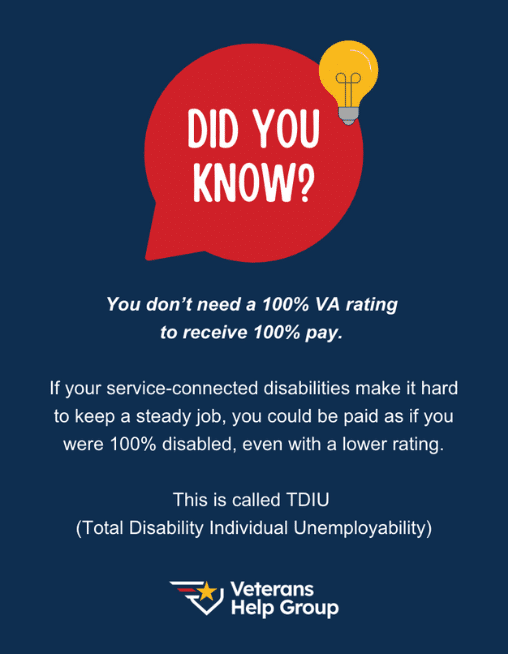TDIU Claim Advocates
Total Disability based on Individual Employability (TDIU) is a Department of Veterans Affairs program that meets the financial needs and requirements of veterans whose service-related injuries and disabilities, such as exposure to environmental hazards or chronic pain, keep them from working. If you are an eligible veteran, you can obtain disability compensation at the 100% rate without a 100% disability rating.
So, veterans receiving Total Disability based on Individual Unemployability benefits receive financial compensation at the same rate as people who are deemed 100% disabled.
However, keep in mind that it is usually simpler to be approved for TDIU benefits than to earn a 100 percent rating under the VA’s schedular criteria.
A trained and experienced veterans’ benefits advocate will help you decide which option is better for your unique situation and circumstances.
The advocates at Veterans Help Group help disabled veterans receive TDIU benefits and compensation. From our offices in Plantation, Florida, we represent veterans throughout Florida.
What is TDIU?
TDIU stands for Total Disability Individual Unemployability. It’s a rating designated by the US VA Department for veterans who are not able to work because of disability.
Veterans who cannot obtain or maintain employment because of injuries or conditions, such as Post-Traumatic Stress Disorder (PTSD) or traumatic brain injury, sustained from their time in service can be granted TDIU. Did you know that these benefits pay at the same level as benefits paid to a veteran who has received a 100 percent disability rating?
And veterans not able to obtain or maintain “substantially gainful” employment because of service-connected conditions or disability can qualify for Individual Unemployability benefits.
What is the Meaning of Substantially Gainful?
The US VA uses the term “substantially gainful” to refer to employment for which a veteran earns above the poverty level. According to the poverty guidelines for 2021, an individual earning less than $12,880 per year is earning below the poverty level.
Also, VA regulations state that sheltered employment, such as self-employment or working for a family business, is not considered substantially gainful employment for this purpose.

Is TDIU Permanent?
While TDIU can be permanent, it is not necessarily permanent. The VA may send a veteran to periodic medical exams to evaluate whether TDIU is still warranted. However, the VA cannot just take TDIU away without justification. There are safeguards in place to prevent that.
Keep in mind that if the VA decides that your TDIU benefits are permanent, they will indicate this in your rating decision. And it can be done in one of many ways: such as
- There might be a “Permanent and Total” box on your claim form that’s checked
- The form might state “no further examinations are scheduled”
- Your letter may suggest you’re eligible for CHAMPVA benefits or Chapter 35 DEA benefits
Also, your initially temporary TDIU benefits can become permanent. This usually happens if you’re 70 years or older or you’ve received TDIU benefits for at least twenty years consecutively.
How are Disability Ratings Calculated?
If you have a 0% rating, it means that your condition is service-connected. However, it causes no measurable impairment. On the other hand, a 100% rating means that the condition or injury causes severe impairment, causing an inability to work or live independently.
How is TDIU Eligibility Determined?
Although standard VA disability ratings tend to focus on your mental or physical handicap, the TDIU program is more comprehensive and goes further by taking your employability into account.
So, it’s intended for specific cases in which an applicant’s service-connected impairment or injury (or multiple injuries) prevents them from engaging in substantially gainful employment.
In order to prove eligibility for this program, you must establish that:
- You are a veteran
- You are not able to engage in substantially gainful employment due to a service-related disability, such as hearing loss
- You weren’t dishonorably discharged
- You have either:
- A single disability that’s rated at least 60 percent
- More than one disability, with one disability rated 40% (at least), and a total rating of 70% (at least)
Remember that TDIU looks at your work experience, disability limitations, education, earnings, and the circumstances of your current employment in order to determine eligibility. An experienced advocate skilled in interpreting VA law and regulations can help you collect the necessary evidence, such as medical records, to make a strong case for benefits.
Even if a veteran does or can work, if that work isn’t deemed substantially gainful employment or is performed in a protected environment, the veteran might still be entitled to receive TDIU benefits. Work is considered substantially gainful if it allows you to make a living on par with a nondisabled individual typical of the location and industry. Also, marginal employment—any job that will earn you only a minimal amount—isn’t substantially gainful.
Evidence for TDIU Benefits
To prove entitlement to your individual unemployability benefits, you can submit evidence like Social Security determinations, lay evidence, medical records, medical opinions, and vocational assessments.
Medical evidence that allows evaluation of your current mental and physical condition can include results of VA examinations, outpatient records, and hospital reports. Keep in mind that the VA can schedule a medical exam if your medical evidence is inconsistent or incomplete.
The VA may require employment and work history for 5 years before the date on which you became too disabled to work and for any work done after this date.
If the veteran has participated in a VA vocational rehabilitation program, the VA must also consider this evidence.
Can the VA Terminate or Reduce Your TDIU Benefits?
Also, your TDIU rating can be reduced if you’re able to maintain substantially gainful employment for twelve consecutive months. This rule, however, does not apply if you work in a protected work environment.
When Should You Apply for TDIU?
You Can’t Maintain Steady Employment
Total Disability Individual Unemployability indicates a level of employability that’s less than 100%. This means that if you have a combined disability rating of 70% with at least a single disability with a rating of 40 percent and these disabilities make it impossible to keep a job, you are advised to seek TDIU.
You can’t Earn More than the Poverty Limit Because of Your disabilities
While TDIU doesn’t require a veteran to be incapable of doing any kind of work, they must be unable to maintain gainful employment. Also, marginal employment is usually not deemed gainful employment.
As a result, it should not keep you from getting a total disability individual unemployability rating.
Applying for TDIU Benefits
After that, the VA will contact your former or current employers in order to discuss your employment history. You can also submit additional evidence and records supporting your case, such as medical opinions, vocational rehabilitation, and employment records, statements from family, friends, and coworkers, and proof that you are currently receiving SSI or SSDI benefits.
Veterans Disability Advocates for TDIU Benefits
Note that when this happens, the VA provides disability benefits that are commensurate with your reduced capacity for employment.
However, in many cases, a veteran’s mental and physical disabilities are so severe that they cannot work. These individuals can qualify for (TDIU) benefits. Our team of advocates has helped veterans in Florida receive the disability benefits they are entitled to get.
Veterans Help Group have supported veterans in getting the benefits they deserve since 1995. If you or a loved one served and is unable to work, we are here to help.
Speak With an Experienced Veterans Benefits Advocate
If your service-related impairment or injury has precluded you from engaging in meaningful, steady employment, you might qualify for TDIU benefits. A trained and experienced advocate in Florida can help assess your situation, gather pertinent evidence, and submit the best case to the VA. Unlike other companies in Florida, we focus only on veterans’ disability claims.
To get started with your veteran’s disability claim, please contact us at 855-855-8992 or get started with our free case evaluation tool. We look forward to speaking with you and learning how we can help.
WHAT OUR CLIENTS SAY
LATEST NEWS
Veterans Help Group’s Free SSDI Screener: See If You Qualify Today
Veterans Help Group's Free SSDI Screener: See If You Qualify Today If...
Discounts for Military Veterans 2026
Discounts for Military Veterans 2026 As a military veteran, numerous...
100% VA Disability Benefits List For 2026
100% VA Disability Benefits List for 2026 When a veteran is approved for...
FREE CASE EVALUATION
"*" indicates required fields





